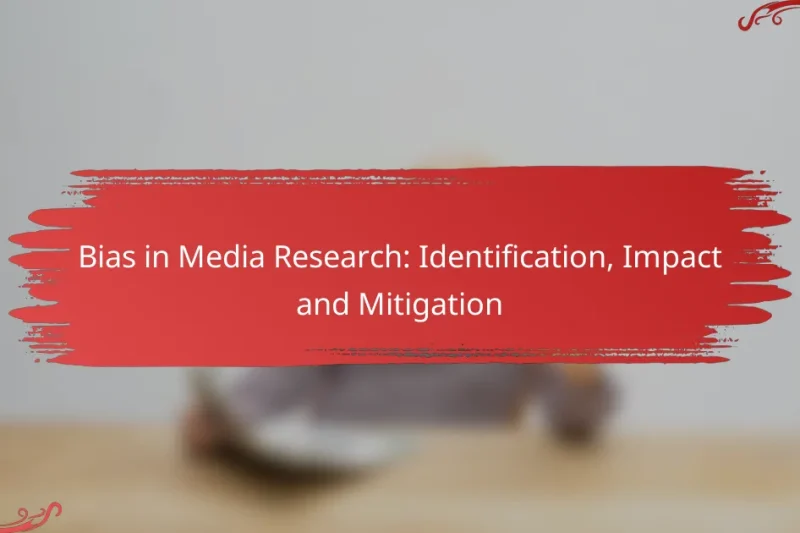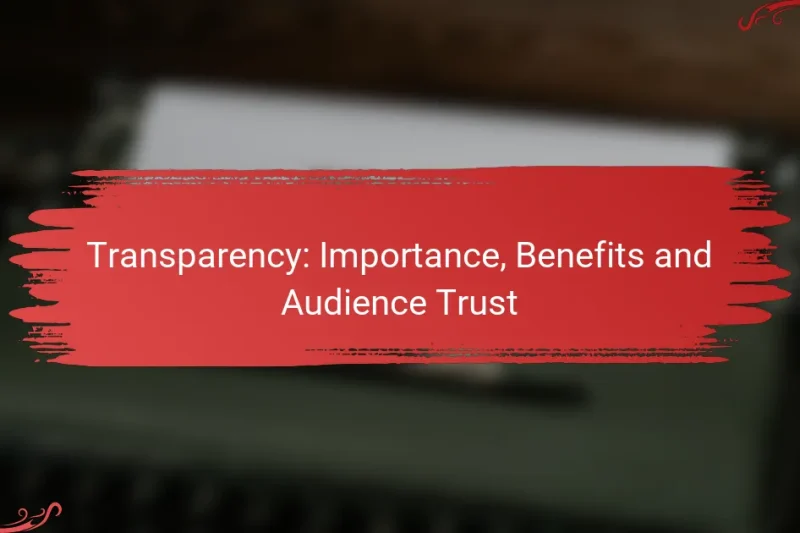Ethical reporting is grounded in key principles such as accuracy, transparency, respect for privacy, and accountability, … Ethical Reporting: Principles, Methods and AccountabilityRead more
Ethics in Media Research
Ethics in media research is crucial for maintaining the integrity of the research process and safeguarding the rights of participants. It involves principles such as informed consent, data privacy, and transparency, which are essential for fostering trust and accountability. Adhering to established ethical guidelines not only protects individuals but also enhances the credibility of the research and the organizations involved.
Bias in Media Research: Identification, Impact and Mitigation
Bias in media research poses significant challenges to the integrity and reliability of findings, often distorting … Bias in Media Research: Identification, Impact and MitigationRead more
Compliance Regulations: Key Frameworks and Requirements
Compliance regulations play a crucial role in safeguarding sensitive information and ensuring privacy across various sectors. … Compliance Regulations: Key Frameworks and RequirementsRead more
Ethical Guidelines: Standards, Compliance and Best Practices
Ethical guidelines in advertising are essential for fostering honesty, transparency, and responsibility in marketing practices. By … Ethical Guidelines: Standards, Compliance and Best PracticesRead more
Data Privacy: Strategies, Tools and Regulations
Data privacy is a critical concern for businesses and individuals alike, necessitating effective strategies, tools, and … Data Privacy: Strategies, Tools and RegulationsRead more
Ethical Dilemmas: Case Studies and Lessons Learned
Ethical dilemmas in business present complex challenges where conflicting values must be navigated, often pitting profit … Ethical Dilemmas: Case Studies and Lessons LearnedRead more
Transparency: Importance, Benefits and Audience Trust
Transparency in advertising is essential for building trust between brands and their audiences. By openly communicating … Transparency: Importance, Benefits and Audience TrustRead more
What are the ethical considerations in media research?
Ethical considerations in media research encompass principles that ensure the integrity of the research process and the protection of participants. Key aspects include informed consent, data privacy, transparency in methodology, and accountability for findings.
Informed consent
Informed consent is the process of obtaining voluntary agreement from participants before involving them in research. This requires clearly communicating the purpose, procedures, risks, and benefits of the study, allowing individuals to make an educated decision about their participation.
Researchers should provide consent forms that are easy to understand, avoiding technical jargon. It is crucial to ensure that participants feel free to withdraw at any time without facing negative consequences.
Data privacy
Data privacy involves protecting the personal information of participants throughout the research process. Researchers must implement measures to secure data and ensure that it is anonymized or aggregated to prevent identification of individuals.
Compliance with local regulations, such as the General Data Protection Regulation (GDPR) in Europe, is essential. Researchers should also inform participants about how their data will be used, stored, and shared, fostering trust and transparency.
Transparency in methodology
Transparency in methodology refers to clearly outlining the research design, data collection methods, and analysis techniques used in the study. This allows others to evaluate the validity and reliability of the findings.
Researchers should publish detailed descriptions of their methodologies, including any limitations or potential biases. This practice not only enhances credibility but also facilitates replication and further investigation by other scholars.
Accountability for findings
Accountability for findings means that researchers must take responsibility for the outcomes of their work, ensuring that results are reported honestly and accurately. This includes acknowledging any conflicts of interest and the implications of the research.
Researchers should be prepared to defend their conclusions and provide access to their data and methods for peer review. This accountability fosters trust in the research community and among the public, reinforcing the ethical standards of media research.
How can researchers ensure ethical practices?
Researchers can ensure ethical practices by adhering to established guidelines, implementing robust review processes, and providing ongoing ethics training. These steps help maintain integrity and accountability in media research.
Adopt ethical guidelines from APA
Adopting ethical guidelines from the American Psychological Association (APA) is essential for researchers. These guidelines cover various aspects, including informed consent, confidentiality, and the responsible reporting of research findings. By following these principles, researchers can protect participants and enhance the credibility of their work.
For example, obtaining informed consent means clearly explaining the research purpose and any potential risks to participants. This transparency fosters trust and ensures that participants are fully aware of their involvement.
Implement peer review processes
Implementing peer review processes is crucial for ensuring the quality and ethical standards of research. Peer review involves having experts evaluate a study before publication, which helps identify any ethical concerns or methodological flaws. This process not only enhances the research’s credibility but also promotes accountability among researchers.
To establish an effective peer review system, researchers should seek reviewers who are knowledgeable about the subject matter and ethical considerations relevant to the study. This can include checking for conflicts of interest and ensuring that all ethical guidelines are followed.
Conduct regular ethics training
Conducting regular ethics training is vital for keeping researchers informed about the latest ethical standards and practices. Training sessions can cover topics such as data management, participant rights, and ethical dilemmas that may arise during research. Regular updates help reinforce the importance of ethics in research.
Organizations can implement training programs that include workshops, seminars, or online courses. These programs should be mandatory for all researchers and can be tailored to address specific ethical challenges in media research.
What are the consequences of unethical media research?
Unethical media research can lead to significant negative outcomes, including loss of trust, legal issues, and harm to public image. These consequences can affect not only the researchers but also the organizations they represent and the broader media landscape.
Loss of credibility
When media research is conducted unethically, it undermines the credibility of the findings. Researchers and organizations may find it challenging to regain trust from their audience, stakeholders, and peers. This loss of credibility can lead to decreased funding opportunities and collaboration prospects.
For instance, if a study is found to manipulate data or misrepresent results, it can tarnish the reputation of the researchers involved. Over time, this can result in a general skepticism towards future research from the same sources.
Legal repercussions
Engaging in unethical media research can expose individuals and organizations to legal challenges. Violations of privacy, data protection laws, or intellectual property rights can lead to lawsuits and financial penalties. In many jurisdictions, ethical guidelines are not just best practices but are also enshrined in law.
For example, if researchers fail to obtain proper consent from participants, they may face legal action under regulations such as the General Data Protection Regulation (GDPR) in Europe. This can result in hefty fines and damage to the organization’s financial standing.
Negative public perception
Unethical media research can lead to a negative public perception, which can be difficult to reverse. Audiences may view the organization as untrustworthy, leading to a decline in engagement and support. This perception can spread quickly through social media and news outlets, amplifying the impact.
For example, if a media outlet is caught fabricating survey results, it may face backlash from the public, resulting in a loss of viewership and advertising revenue. Maintaining ethical standards is crucial for sustaining a positive relationship with the audience.
What frameworks support ethical media research?
Ethical media research is guided by established frameworks that ensure the integrity and responsibility of research practices. These frameworks provide principles and guidelines that help researchers navigate ethical dilemmas and protect participants’ rights.
Belmont Report principles
The Belmont Report outlines three core principles for ethical research: respect for persons, beneficence, and justice. Respect for persons emphasizes informed consent and the autonomy of participants, while beneficence focuses on maximizing benefits and minimizing harm. Justice ensures equitable distribution of research benefits and burdens among different groups.
Researchers should apply these principles by obtaining informed consent from participants, assessing potential risks and benefits, and ensuring that vulnerable populations are not exploited. For instance, when conducting studies involving children, researchers must take extra precautions to protect their welfare and rights.
International ethical standards
International ethical standards, such as the Declaration of Helsinki and the guidelines from the World Health Organization (WHO), provide a global framework for conducting ethical research. These standards emphasize the importance of ethical review processes and the need for transparency in research practices.
Adhering to these international standards requires researchers to submit their studies for ethical review by an independent committee. This process helps to ensure that research is conducted responsibly, particularly in cross-border studies where cultural and legal differences may arise. For example, researchers should be aware of local regulations regarding data privacy and participant consent in different countries.
How does ethics in media research impact society?
Ethics in media research significantly shapes societal norms and values by influencing how information is gathered, presented, and interpreted. Ethical considerations ensure that research respects individuals’ rights and promotes trust in media, ultimately affecting public discourse and behavior.
Influence on public opinion
Media research plays a crucial role in shaping public opinion by determining which narratives are amplified and how they are framed. Ethical media research prioritizes transparency and accuracy, which fosters informed public discourse. When research is conducted ethically, it can help counter misinformation and promote a more educated society.
For instance, studies that adhere to ethical standards are more likely to produce reliable data, which can guide public understanding of critical issues such as health, politics, and social justice. This reliability can lead to a more engaged and informed citizenry, capable of making better decisions.
Shaping policy decisions
Ethical media research directly influences policy decisions by providing lawmakers with credible data and insights. When research is conducted with integrity, it can highlight societal needs and inform effective policy responses. Ethical considerations help ensure that the research reflects diverse perspectives and does not manipulate data to serve specific agendas.
For example, ethical studies on media consumption patterns can guide regulations on advertising, especially regarding vulnerable populations like children. Policymakers rely on such research to create frameworks that protect the public while promoting fair media practices.
What are emerging trends in ethical media research?
Emerging trends in ethical media research focus on addressing the complexities of new technologies and the need for inclusivity. Researchers are increasingly prioritizing ethical considerations to ensure responsible practices that reflect diverse perspectives and mitigate biases.
Increased focus on AI ethics
The rise of artificial intelligence in media research has prompted a significant emphasis on AI ethics. Researchers must consider issues such as algorithmic bias, transparency, and accountability when developing AI-driven tools and methodologies.
For example, ensuring that AI systems do not perpetuate existing stereotypes requires rigorous testing and validation. Researchers should implement guidelines that promote fairness and inclusivity in AI applications, which may involve regular audits and stakeholder feedback.
Integration of diversity and inclusion
Incorporating diversity and inclusion into media research is becoming essential for producing relevant and representative findings. This trend encourages researchers to engage with a broad range of voices and perspectives, particularly those from marginalized communities.
Practically, this can involve forming diverse research teams and actively seeking input from various demographic groups. Researchers should also consider the cultural context of their studies, ensuring that their methodologies and interpretations are sensitive to different backgrounds and experiences.






